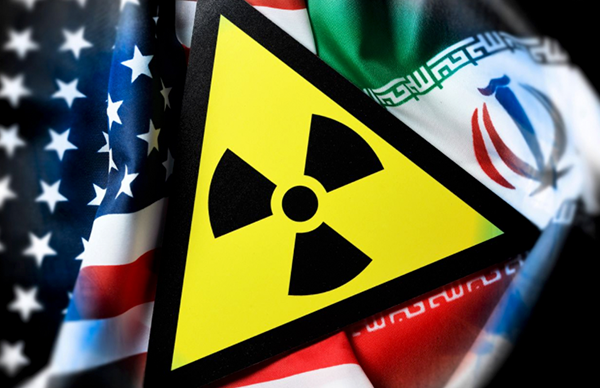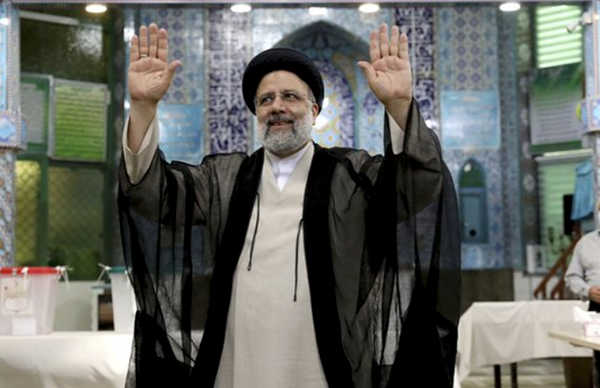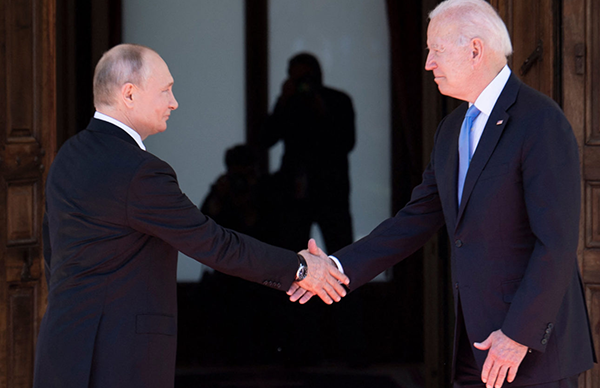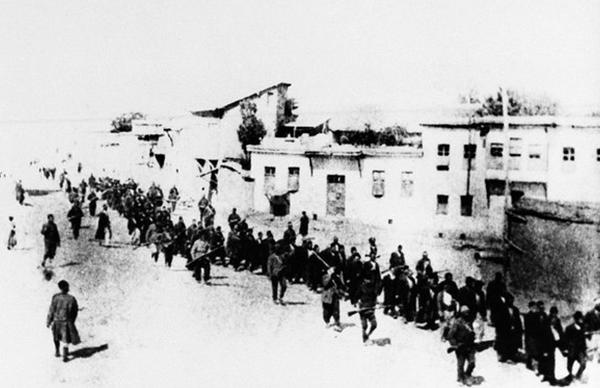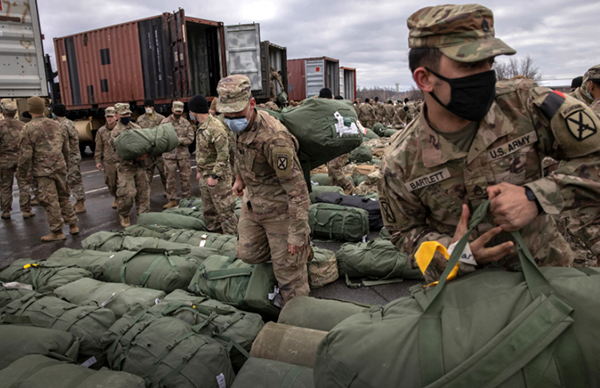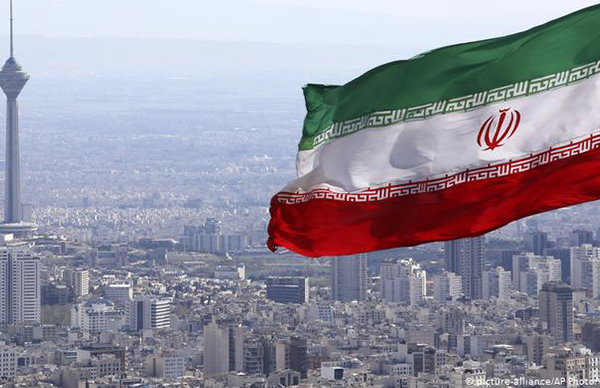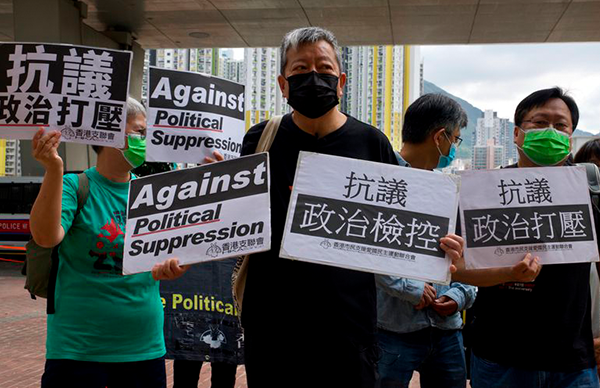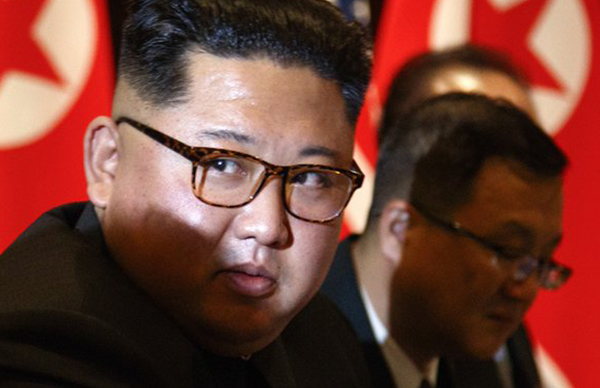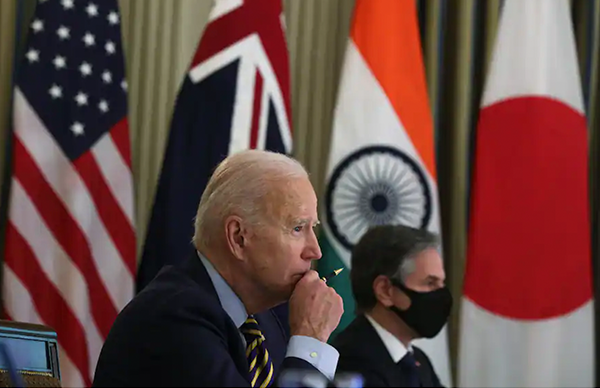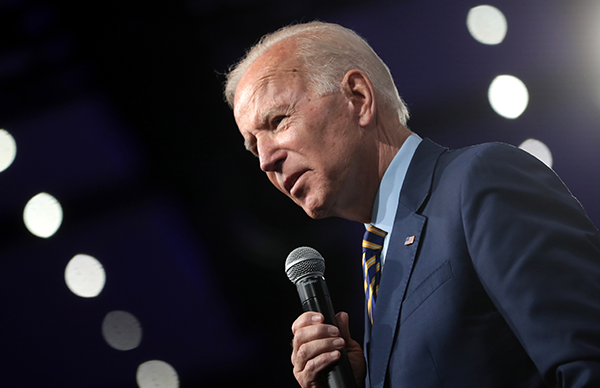By Dr. David Wurmser
April 26, 2021
It has been a month since Nowruz, the Persian holiday marking the beginning of Farvardin and turn of the new year, which this year is 1400. This was a welcome turnover for the Iranian regime. 1399 was a miserable year. Iran suffered not only a divinely inflicted plague in COVID-19, but also a manmade exacerbation by breakdown and extreme governmental mismanagement of the epidemic. Iran’s external adventures proved no quarter for diversion or respite either. Its proxy, Hizballah, suffered a devasting blow politically when one of its storage depots in Lebanon accidentally exploded and destroyed the center of Beirut on August 4, killing hundreds. The regime started 1399 reeling from the humiliating demise of the RGC al-Qods Corps commander, Ghassan Soleimani, at the hands of a US drone. Later in the year, Brigadier General Mohsen Fakhrizadeh, who led the IRGC’s nuclear program, was also assassinated by unknown assailants. Both deaths of these high-profile humiliations remain glaringly unavenged, despite shrill rhetoric by Iran’s leaders promising to visit the gates of hell on the perpetrators. Instead of inflicting revenge, Iran found itself even further humiliated when its strategic programs suffered a long series of incidents, accidents and unrest in the summer and fall that damaged many Iranian facilities suspected of being involved in some way with its nuclear or ballistic programs.
Along the way, Iran’s economy continued its collapse and its currency continues to plunge at faster rates than gravity can pull it. And the inevitable constant underlying din of riots and demonstrations persisted. Iran’s regime indeed faced a miserable year, perhaps the most miserable since its inception in 1979.
Now that Iran is about a month into 1400, it is apparent this year has thus far failed to turn around last year’s misery. COVID-19 rages at astronomical rates, vaccinations having barely started, the economy continues to sink, and the mysterious accidents and incidents at key strategic facilities carry on. On the high seas, after having attempted to environmentally destroy Israel’s Mediterranean coast, Iran’s floating IRGC ships conducting strategic activities in critical sea lanes have now too begin suffering such incidents and sit still now dead in the water.
In short, while the Biden administration seems determined to restore the JCPOA lift sanctions on Iran, and halt the clandestine activities – whom leaking US officials attribute to Israel – thus far the economy continues to sink, the mysterious actions against strategic targets continue and the Israelis openly vow to continue to do whatever they need to do to stop Iran’s regional, nuclear and ballistic ambitions. And whether by the hand of God or man, top IRGC officials continue to die under obscure circumstances, the latest being Mohammed Hejazi, the head of the IRGC ballistic programs and liaison with Lebanese Hizballah and the Yemeni Houthis. The regime – including Supreme Leader Ayatollah Khamenei himself — at first said he “died suddenly after a long illness” – itself a rather curious phrase. But by the next day, many Iranian senior officials, not just bloggers, openly questioned the honesty of the reports, and instead said he was martyred. One senior official, Amir Moghadam, said his death was connected to the attack attributed to Israel by US officials on the Iranian IRGC operations ship last month in the Red Sea. Others now say that he was killed in the Marib Governate in Yemen in an attack, while some papers in Kuwait, citing Iranian sources, believe he had been murdered by poison in his last trip to Iraq or Syria. What really happened with General Hejazi will remain a mystery, but the bottom line is that the Iranian regime ends the year with its own senior officials unwilling to buy anything as truthful said by any other official of the regime. Everyone is scrambling into the safety of his own self-serving conspiracy theory du jour to cope with the undigestible reality that the enemies of Iran’s regime, likely Israel, operate devastatingly at will within Iran’s most sensitive facilities and most important people.
In the end, Iran is facing five extremely dangerous but inescapable realities with which it must cope:
• Iran’s economy is in freefall;
• Its strategic programs (nuclear, missiles, regional proxy warfare) are constantly and apparently largely successfully battered by Israeli actions;
• It has faced a years-long diet of serial humiliations at the hands of the Israelis and US under the previous administration that created a climate of malaise, penetration and impotence – all fatal reputations for a regime that survives trafficking in their brutality and internal terror to cower the domestic population;
• All of its attempts at revenge or escalation have met with further high-profile, humiliating setbacks, having fizzled, been preempted, or answered; and
• The fundamental dishonesty of the regime, which was necessary to avoid admitting failure and projecting weakness, has become so pervasive that it has led to a widespread expectation of dishonesty, both in the population and even among elites. This has created an ironic, but very dangerous, condition where even when the regime tells the truth, it is not believed and instead everyone descends into conspiratorial speculations about the “real” story. These developments lead to the fundamental breakdown of the very stability and public stature that the regime hoped to solidify by employing dishonesty to begin with. For example, the deputy head of the IRGC may indeed have died of a heart attack on April 18, but nobody believes it. Instead, Iranian elites are descending into wild speculations that this was yet another assassination – thus further destabilizing the regime and deepening its reputation of impotence.
These conditions have led to several realizations in Tehran:
• Despite relentless effort, Iran’s regional strategy is thus far still frustrated.
• While Iran does have escalatory actions against Israel it can take, some of which can be painful, it also realizes it will pay an even heavier, perhaps fatal, price for any escalation against Israel.
• While the leadership externally evinces bluster, the economic pressures and constant frustration and assault from outside has internally led various leadership cliques to descend into internecine bickering against each other, which could even lead to internal violence and collapse.
So where does the Iranian government go forward from here?
The current crop of Iranian leaders are if nothing else excellent students of manipulation. They are the modern inheritors of Shehrazad, the doomed woman who used her storytelling acumen to transform her position of absolute weakness and imminent execution ultimately into a position of unfettered control of the soul of her would be executioner and the man who became her husband, the ruler Shariyar. She transformed her reality of passive weakness into absolute power.
The strategy of the modern Sherazads in Tehran is already coming into focus. There is nothing the regime wants and needs more than:
• Have sanctions lifted and cash flowing into their coffers
• Have the Israelis stymied or tethered in pursuing their relentless shadow war against Iran’s nuclear and ballistic programs, against Iran’s regional attempts at strategic advance, and against Iran’s international structure of land and maritime terrorism.
To these ends, the Iranian government is painfully aware that China can deliver nothing. Russia is both unwilling and unable to stop the Israelis, and it may in fact be increasingly suspicious of Iran for its own reasons. Europe is altogether of marginal relevance. Only the United States can deliver the coin and calm that the regime needs to regain its footing and strategic initiative., or so Tehran believes.
As such, Iran’s strategy ultimately boils down to manipulating Washington into opening the spigot of funds to Tehran and into leaning so heavily on its ally, Israel, that the latter retreats into acquiescence and strategic passivity. In other words, Iran’s strategy is to get money and to cause so deep a rift between Jerusalem and Washington that it leaves Jerusalem paralyzed.
In this context, Iran is once again employing its apologists overtime in an effort to pray on the fears so often raised in Western capitals of some sort of apocalyptic upheaval were to ensue were Israel to seriously wound Iran. Added to this is the strategy – a modification of the “good vs bad” cop interrogation model to diplomacy — first employed by the Nazi propagandist, the Harvard-educated Ernst “Putzi” Hanfstaengl, perfected by the Soviets during the arms control talks by Andrei Gromyko, and embraced finally wholeheartedly by Palestinian negotiators in the seasonal assortments of Arab-Israeli peace processes: namely, that the West must concede to validate and empower the other side’s moderates while tethering its own hawks in order to discredit the other side’s eternally looming threating hardliners. It was a strategy which has worked far too often to manipulate Western leaders and their diplomats into preemptive concessions.
The current urgency in Washington to reach a new JCPOA, at all costs it appears, is a framed into this context. Iran has national elections in June. Tehran is happily encouraging its apologists in the West to emphasize that a tough Western negotiating position would not only render a deal impossible – and the much-threatened quasi-apocalyptical escalation ensue – but would lead to the election of hardliners and the defeat of ostensible moderates, such as Rouhani.
As such, Iran is holding the upcoming June elections as a convenient venue to hold fire to the heels of Western diplomats’ feet. A deal must be reached in weeks, or the “window of opportunity” supposedly closes and the region will descend into an unimaginably horrific convulsion.
In-the-know senior Iranian officials in their energy and nuclear bureaucracies have emphasized in unguarded moments that the incident at Natanz in early April destroyed thousands of centrifuges and was a blow around which Iran cannot easily work for quite some time – having essentially shut down large-scale enrichment. Incidents last summer similarly hampered their strategic programs. And yet, because of its strategy, Tehran must downplay the setbacks it so often suffered, and instead needs at all costs to put on a Potemkin-like display of its strength, prowess, and escalatory capabilities by enriching a small amount of uranium apparently to 60% and firing a missile large enough to be nuclear-capable. Like one of the last Qajar Shahs who upon death (by assassination) was paraded around the capital for days with a mechanical waiving arm to show the realm that he was not dead, when in fact he was, Iran needs to project an invincible capability to threaten.
This is all a charade to create an international climate of acute crisis and extreme danger of escalation as part of its strategy to press the West into making the necessary concessions to return to a weakened JCPOA, which in turn would unlock finds and cause serious tensions between Washington and Jerusalem. Sadly, it appears likely that Washington will plunge headlong into this trap.
However, Iran will find that the last four years have changed much. Four years ago, the Israelis suspected that the constant threat of escalation to apocalyptic levels from Tehran was overblown. Iran clearly has means to inflict great pain on Israel – hundreds of thousands of missiles in Lebanon – but when Israeli strategists gamed out the scenarios in exercise after exercise, it was consistently Iran, not Israel, that came up with the short straw in the escalatory cycle. But even then, these were theories of how Iran would and could respond; there was not hard evidence.
But the last four years have shown us that when challenged and resolutely confronted, Iran’s options are indeed far more limited than Tehran projects. It has tried for years to escalate in Syria, but both its senior officers and its forces lay dead on Syrian soil and its assets smoldering. It is no closer to consolidating its grip on Syria than it was several years ago. Moreover, since last summer, its grip on Lebanon was rattled. Neither could it deliver its Houthi allies to victory in Saudi Arabia, nor even bring down one of its main targets in the Gulf: Bahrain. And every time it attempted to launch a retaliation against Israel, it only wound up facing an even more deeply embarrassing failure.
To be sure, Iran is a threat, and a very dangerous one. If its ambitions are realized, it would be catastrophic. Even in its still weakened state, it has killed thousands of Americans and Israelis since the 1979 Islamic Revolution. It sends drones through proxies into Saudi Arabia and paralyzes parts of its oil production, and has left several nations, such as Yemen, Iraq and Lebanon crippled at will. It is currently the greatest threat the United States and its allies face in the region.
But by last summer, the costs of Iran’s regional adventures and the wages of embarrassment it accumulated caused the regime to lose the Iranian street. Demonstrators often took to the streets demanding an end to sacrifice for Gaza, for Palestine, for Lebanon, and that Iranian assets and sacrifice must instead be for Iranians. The Iranian government knows that in a confrontation with the West and Israel, the Iranian street has had enough and are no longer willing to mortgage their reputation and their future on failed adventures. The rulers of Tehran cannot count on their own street anymore. As such, their escalatory hand – already burdened by limited means – is stayed by fear of the Iranian street. While Western elites consistently assume Iranian will rally around their regime if beleaguered, the historical record of the last four years proves otherwise. In a confrontation, Iran’s regime is afraid of its street more than we should be.
As such, the real threat Israel sees is not from acting, but rather from not acting to stop Iran from advancing strategic programs and regional campaigns. A such, while Washington may gallop to a deal with Tehran, all it will likely achieve is not calm, but an escalated shadow war that leaves the United States weakened, untrusted, and looking increasingly as marginalized in real terms as its EU partners have been for quite some time in the region. And our allies – the genuine ones, like Israel, the UAE, Bahrain and others – will look stronger and at each other to carry the burden of protecting our and their interests until such time as we return to ourselves. Because while Washington may fall prey to Shehrazad’s charms, Jerusalem, Abu Dhabi, Manama and the rest will not and are no mood for further tales of 1001 nights. Eventually, the feared morning will come for the Islamic Republic.
